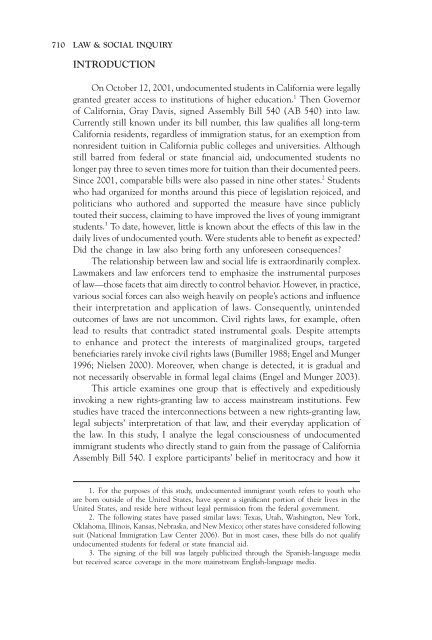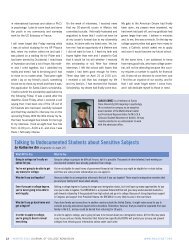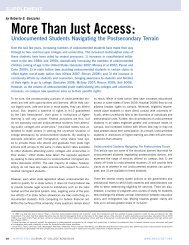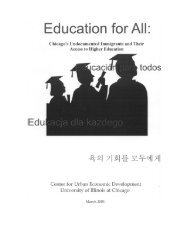Legitimacy, Social Identity, and the Mobilization of Law: The Effects ...
Legitimacy, Social Identity, and the Mobilization of Law: The Effects ...
Legitimacy, Social Identity, and the Mobilization of Law: The Effects ...
You also want an ePaper? Increase the reach of your titles
YUMPU automatically turns print PDFs into web optimized ePapers that Google loves.
710LAW & SOCIAL INQUIRYINTRODUCTIONOn October 12, 2001, undocumented students in California were legallygranted greater access to institutions <strong>of</strong> higher education. 1 <strong>The</strong>n Governor<strong>of</strong> California, Gray Davis, signed Assembly Bill 540 (AB 540) into law.Currently still known under its bill number, this law qualifies all long-termCalifornia residents, regardless <strong>of</strong> immigration status, for an exemption fromnonresident tuition in California public colleges <strong>and</strong> universities. Althoughstill barred from federal or state financial aid, undocumented students nolonger pay three to seven times more for tuition than <strong>the</strong>ir documented peers.Since 2001, comparable bills were also passed in nine o<strong>the</strong>r states. 2 Studentswho had organized for months around this piece <strong>of</strong> legislation rejoiced, <strong>and</strong>politicians who authored <strong>and</strong> supported <strong>the</strong> measure have since publiclytouted <strong>the</strong>ir success, claiming to have improved <strong>the</strong> lives <strong>of</strong> young immigrantstudents. 3 To date, however, little is known about <strong>the</strong> effects <strong>of</strong> this law in <strong>the</strong>daily lives <strong>of</strong> undocumented youth. Were students able to benefit as expected?Did <strong>the</strong> change in law also bring forth any unforeseen consequences?<strong>The</strong> relationship between law <strong>and</strong> social life is extraordinarily complex.<strong>Law</strong>makers <strong>and</strong> law enforcers tend to emphasize <strong>the</strong> instrumental purposes<strong>of</strong> law—those facets that aim directly to control behavior. However, in practice,various social forces can also weigh heavily on people’s actions <strong>and</strong> influence<strong>the</strong>ir interpretation <strong>and</strong> application <strong>of</strong> laws. Consequently, unintendedoutcomes <strong>of</strong> laws are not uncommon. Civil rights laws, for example, <strong>of</strong>tenlead to results that contradict stated instrumental goals. Despite attemptsto enhance <strong>and</strong> protect <strong>the</strong> interests <strong>of</strong> marginalized groups, targetedbeneficiaries rarely invoke civil rights laws (Bumiller 1988; Engel <strong>and</strong> Munger1996; Nielsen 2000). Moreover, when change is detected, it is gradual <strong>and</strong>not necessarily observable in formal legal claims (Engel <strong>and</strong> Munger 2003).This article examines one group that is effectively <strong>and</strong> expeditiouslyinvoking a new rights-granting law to access mainstream institutions. Fewstudies have traced <strong>the</strong> interconnections between a new rights-granting law,legal subjects’ interpretation <strong>of</strong> that law, <strong>and</strong> <strong>the</strong>ir everyday application <strong>of</strong><strong>the</strong> law. In this study, I analyze <strong>the</strong> legal consciousness <strong>of</strong> undocumentedimmigrant students who directly st<strong>and</strong> to gain from <strong>the</strong> passage <strong>of</strong> CaliforniaAssembly Bill 540. I explore participants’ belief in meritocracy <strong>and</strong> how it1. For <strong>the</strong> purposes <strong>of</strong> this study, undocumented immigrant youth refers to youth whoare born outside <strong>of</strong> <strong>the</strong> United States, have spent a significant portion <strong>of</strong> <strong>the</strong>ir lives in <strong>the</strong>United States, <strong>and</strong> reside here without legal permission from <strong>the</strong> federal government.2. <strong>The</strong> following states have passed similar laws: Texas, Utah, Washington, New York,Oklahoma, Illinois, Kansas, Nebraska, <strong>and</strong> New Mexico; o<strong>the</strong>r states have considered followingsuit (National Immigration <strong>Law</strong> Center 2006). But in most cases, <strong>the</strong>se bills do not qualifyundocumented students for federal or state financial aid.3. <strong>The</strong> signing <strong>of</strong> <strong>the</strong> bill was largely publicized through <strong>the</strong> Spanish-language mediabut received scarce coverage in <strong>the</strong> more mainstream English-language media.






